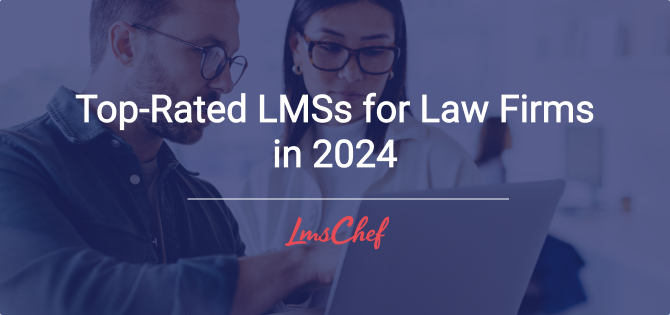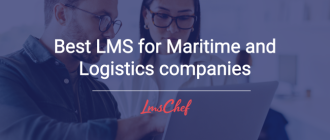If you’re seeking the best LMS for law firms, making the right choice is critical for streamlining your team’s legal education and compliance training. This guide cuts through the clutter, offering a focused look at top-tier LMS platforms that match the unique requirements of legal professionals, from accessibility to security, without the fluff.
Key Takeaways
- An LMS is an essential tool in the legal sector for promoting consistent legal training, adapting to regulatory changes, and fitting the busy schedules of legal professionals.
- Top LMS features for law firms include customizable learning paths, mobile learning capabilities, integration with existing systems, and robust compliance tracking for CLE management.
- When selecting an LMS, law firms should prioritize scalability, integration aptitude, data protection measures, and the ability to demonstrate a return on investment through comprehensive reporting tools.
Understanding the Value of LMS in the Legal Sphere
An LMS wields significant power in a law firm, as it provides a unified learning environment for all employees, promoting a consistent comprehension of legal matters and enhancing their legal knowledge. The ability to tailor training to specific needs and diverse legal fields, and to adapt to regulatory changes and new technologies, puts it at the forefront of legal education.
This transformative tool does not stop at just providing standardized content that can be updated regularly. Moreover, it accommodates the busy schedules of legal professionals by enabling learning at their own pace and convenience. When properly utilized, an LMS amplifies its effectiveness in a law firm, helping legal professionals stay updated and fostering their professional growth.
Essential Features of Leading Law Firm LMS Platforms
A host of essential features are equipped within leading LMS platforms for law firms. These include customizable learning paths, mobile learning capabilities, and robust compliance tracking and reporting features, to name a few.
Customizable Courses for Diverse Legal Fields
Advanced LMS systems offer the capability to:
- Set up personalized learning paths
- Enable tailored training that meets the specific needs of individual lawyers
- Accommodate the busy routines of legal professionals
- Allow them to access educational materials as per their schedules.
Moreover, law firms and legal departments can utilize an LMS to customize training for various legal fields, such as healthcare law updates and new company initiatives. The integration of the latest legal trends into their training content ensures ongoing professional development.
Mobile Accessibility for Lawyers on the Move
In the digital age, the ability to learn on-the-go is crucial. LMS platforms cater to this need by providing mobile learning capabilities. This feature accommodates the busy schedules of attorneys, making a broad range of professional development materials available for access at any time.
Online learning platforms integrated within an LMS allow legal professionals to access training materials remotely, catering to their efficient learning needs. Platforms like Paradiso LMS and Lawline offer mobile-responsive environments, making them suitable choices for legal professionals on the move.
Continuing Legal Education (CLE) Management
Leading LMS platforms designed for large law firms include automation features to track and report Continuing Legal Education (CLE) credits, as well as course creation tools. This streamlines the process of recording credits earned and reminds lawyers of recertification deadlines, ensuring compliance with mandatory education requirements.
Moreover, LMS platforms can manage certification courses tailored to various state legal training requirements. The success of an LMS in a law firm hinges on demonstrating its benefits, such as identifying and rapidly commencing CLE requirements, which encourages user adoption.
Streamlining Your Training Efforts with Top LMS Solutions

Numerous benefits are offered by implementing an LMS in a law firm. These include:
- Standardized and flexible learning experiences
- Comprehensive tracking of training progress
- Reduced training costs
- Improved regulatory compliance
- Adaptable training programs that can rapidly adjust to shifts in legal requirements
Assigning and Monitoring Learner Progress
Online courses and learner progress are effectively tracked through efficient LMS solutions. They provide law firm employees with 24/7 access to training materials, significantly reducing the time required for in-person training sessions.
Platforms like Intellek’s LMS feature reporting and scheduled reporting features that aid in monitoring user performance. This allows law firms to evaluate the effectiveness of training programs and ensure updates to training materials align with the latest legal developments.
Integration with Existing Systems
For legal firms, the seamless integration of existing organizational platforms like HR and CRM systems is crucial. This ensures scalability and ease of user access. Properly planned data migration is essential, involving only necessary courses and data while ensuring compatibility with the new LMS.
Infrastructure security measures, including antivirus, firewalls, and data encryption, are fundamental for LMS integration within a law firm. Ongoing technical support is also essential to maintain integration efficiency with their existing systems.
Selecting the Best Learning Management System for Your Law Firm
Scalability, seamless integration, data protection, and comprehensive reporting tools are essential considerations when selecting an LMS for a law firm. These factors will effectively track learner progress and demonstrate the ROI of training programs within the firm.
Tailoring to Firm-Specific Needs
Customized LMS solutions tailored to a law firm’s specific needs can improve performance and productivity by providing personalized learning paths and integrating the latest legal trends into training content. This caters to the unique learning needs of each professional, which can lead to improved performance and productivity in the legal sector.
Moreover, legal professionals can use LMS platforms for:
- Instructional design
- Creating engaging, accredited courses
- Part of the firm’s digital marketing strategy
- Professional development offerings.
Protecting Sensitive Client Information
In the legal industry, the protection of sensitive client information is a priority. Therefore, an LMS for law firms should come with strong data encryption and access control features to ensure compliance with data protection laws.
A law firm LMS must comply with relevant laws such as:
- HIPAA
- HITECH
- GLBA
- PCI DSS
to ensure the protection of sensitive information. Moreover, robust security features like data encryption both at rest and during transfer, and secure login protocols, are essential for the protection of sensitive client information.
Implementing an LMS in Your Legal Practice

A well-defined plan, support and training, streamlined training processes, and ongoing evaluation and enhancement of the system, content, and user experience are required for implementing an LMS and a training program in a law firm.
User Training and Adoption Strategies
Securing buy-in from firm leadership is crucial for successful LMS adoption as it promotes technology acceptance throughout the practice. Furthermore, the establishment of a governance model is critical for managing both the project and the management systems throughout its lifecycle.
A user-friendly LMS interface enhances user adoption. By conducting a trial with a select group of users before a full rollout, firms can identify and rectify issues beforehand. Providing extensive user training through mediums like webinars or in-person sessions is key to familiarizing them with the LMS.
Ongoing Support and Maintenance
For the successful operation of an LMS in a law firm, the following are essential:
- Ongoing support and maintenance
- Disaster recovery plans
- 24/7 technical assistance
- Strong support policies from an LMS provider, including ongoing system performance monitoring.
Maintaining data integrity and availability through disaster recovery and business continuity plans is a critical element for an LMS in the event of cyberattacks or other emergencies. Ongoing evaluation and enhancement of the LMS system, content, and user experience is crucial for the successful operation of the platform.
The Best LMS Options for Law Firms in 2024
In 2024, several top LMS options, such as iSpring Learn and Intellek, exist for law firms. These platforms offer user-friendly interfaces, adaptability to the latest legal developments, and comprehensive features to elevate legal training.
Spotlight on User-Friendly Interfaces
As it aligns with the skillsets and abilities of eLearning teams and legal professionals, a user-friendly LMS interface is crucial for ensuring easy navigation and access to coursework. The usability of LMS platforms is a key consideration for law firms, as it directly affects the adoption and effectiveness of the online training programs.
iSpring Learn, for instance, is recognized for its user-friendly interface that facilitates course management and user engagement through features like gamification and social learning. Modern learning management systems, like iSpring Lear, emphasize intuitive user interfaces to enhance user experience and facilitate easy management of online training initiatives for legal firms.
Adapting to the Latest Legal Developments
To adapt to the latest legal developments, LMS platforms in 2024 are expected to incorporate AI, automation, and learner experience enhancements. Westlaw Edge, for example, integrates AI-powered tools and analytics offering legal professionals insights and supporting them in staying current with legal developments.
LexisNexis University provides legal professionals with access to a comprehensive legal research database, ensuring they are informed about recent legal trends and information. The movement towards headless integrations in LMS platforms reflects a tendency towards more customizable and adaptable learning experiences, enabling rapid addition of new legal content.
Summary
As demonstrated, Learning Management Systems are revolutionizing the legal industry, offering a comprehensive solution for continuous learning and development. From customizable learning paths and mobile learning capabilities to robust compliance tracking and reporting features, LMS platforms have become an indispensable tool for law firms.
When selecting an LMS, law firms should consider scalability, seamless integration, data protection, and comprehensive reporting tools. Furthermore, ongoing support and maintenance, including disaster recovery plans and 24/7 technical assistance, are essential for the successful operation of an LMS in a law firm. With the right LMS, law firms can not only streamline their training efforts but also stay ahead of the curve in the rapidly evolving legal landscape.
Frequently Asked Questions
What is the most widely used LMS?
Blackboard is the most widely used LMS, especially in higher education and also popular in the business world for employee training.
Do law firms use zoom?
Yes, some law firms use Zoom for client meetings, group discussions, and webinars as it provides a versatile platform for communication and collaboration.
What is LMS in legal?
LMS in legal refers to Learning Management System, which can be used by large law firms and legal departments to track employees’ training progress and identify valuable course offerings. Using an LMS allows organizations to efficiently manage their training programs.
What software do large law firms use?
Large law firms often use comprehensive case management software like Filevine or cloud-based practice management software like Clio Manage to organize and streamline their casework, client management, and collaboration efforts efficiently. These software options offer integrated systems and tools designed to meet the specific needs of large-scale legal projects.
Why is an LMS important for law firms?
An LMS is important for law firms because it provides a comprehensive solution for continuous learning and development, keeping knowledge and skills up-to-date, and adapting to regulatory changes and new technologies.







